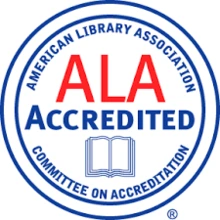

As the only ALA-accredited master's program in Arizona, our highly ranked Master of Arts in Library and Information Science offers flexible options for students studying on our main campus in Tucson or online.
The MLIS requires 37 units and can typically be completed in 2 years for main campus or online students.
Students have up to 6 years from admission term to complete the program.
#24
Best Library and Information Studies Programs
U.S. News & World Report
2024
#13
Best Library and Information Studies Programs: Information Systems
U.S. News & World Report
2024
#18
Best Library and Information Studies Programs: Archives and Preservation
U.S. News & World Report
2024
Specialties
Students may concentrate their coursework in a variety of specialties aligned with career goals.
Click a link below to view more information about MLIS specialties, including recommended courses:
This area of librarianship is a dynamic and evolving profession dedicated to meeting the information and research needs of students, faculty and other members of academic communities. An additional advanced degree as well as an ALA-accredited master’s degree is sometimes expected to obtain an academic librarian position.
Recommended courses:
The primary task of an archivist is to establish and maintain both physical and intellectual control over records of enduring value. Archivists use their knowledge of historical context to select records which are then described and often displayed in line with accepted professional standards and practices. Students interested in archival work can also earn the Certificate in Archival Studies.
Recommended courses:
The rapid growth of digital information and online services has led to a shortage of professionals with the skills to manage digital collections in a fast-changing environment. Students interested in this area may also pursue a Certificate in Digital Curation.
Recommended courses:
This area offers several niches and specializations including foreign and international law, government documents, patents, taxation, computer-related services, administration and special collections such as archives and antiquarian books. While one-third of law librarians have law degrees, most positions do not require a law degree. Students interested in this area can also pursue our graduate certificates in Law Librarianship or Legal Information & Scholarly Communication. The College of Information Science also partners with the James E. Rogers College of Law to offer a dual JD/MLIS degree.
Recommended courses:
This field of librarianship provides information and recreational resources, public meeting space, literacy and community programming, computer training and access, and advocacy for local communities.
Recommended courses:
Student Competencies
MA in Library and Information Science students should gain several competencies when completing the MLIS. These allow students to begin successful careers in libraries and other locations, and should be demonstrated and documented in MLIS student portfolios.
Click a link below to view our student competencies:
MA1) Students will be able to organize, manage, and access information resources from standard library and information science collections and databases.
MA2) Students will be able to apply the results of research in library and information science to practical problems.
MA3) Students will be able to use field-specific techniques to manage resources, services and organizations in their area of career interest.
MA4) Students will be able to articulate the role of diversity in library and information professions and analyze information from diverse perspectives.
MA5) Students will be able to recognize and address ethical issues in library and information settings by proposing reasoned courses of action.
MLIS Curriculum
The Master's in Library and Information Science curriculum reflects the diversity of library and information environments. It touches the areas where students will eventually work and the populations they will serve. It covers various disciplines, ethics and values of library and information science augmented by an interdisciplinary approach to knowledge and information.
Whether completed on campus or online, the Master of Arts in Library and Information Science 37-unit curriculum is comprised of the following courses, as well as a capstone internship and ePortfolio requirement.
Click a link below to view more details, including course descriptions:
Choose one course from each of the following categories:
Cultural Perspective on Libraries & Information
Information Services & Evaluation
Management of Information Services
Information Technology & Networked Digital Information
Students admitted prior to Spring 2018 should refer to course options in their catalog year.
Library and Information Science electives may be selected from the current MLIS specialty areas:
Academic Librarianship
Archives & Special Collections
Digital Curation
Law Librarianship & Legal Information
Public Librarianship
Free electives are comprised of 6 units of any related coursework, and may include individual studies, transfer units or other courses.
The Capstone Internship is comprised of LIS 698: Capstone Internship. Prerequisites include completion of 18 units and completion of LIS 504, LIS 506 and LIS 515. View MLIS Internship for additional information.
Internships
A capstone internship of 3 units is required as part of the Master's in Library and Information Science. All students may participate in an additional regular internship for credit as an elective. Students working in libraries or archives may intern at their place of employment, as long as the requested internship is a project or work separate and distinct from their normal duties.
Learn More About MLIS Internships and Find Internship Opportunities
Law Library Fellowships
The Daniel F. Cracchiolo Law Library offers exceptional opportunities for MLIS students to gain hands-on experience and specialized training in legal librarianship through its Law Library Fellows Program and National Law Library Fellows Program. These prestigious fellowships provide immersive learning experiences, mentorship from expert law librarians and the chance to work closely with legal scholars and professionals. As an MLIS student, these programs offer a unique pathway to advance your career in legal information services while making meaningful contributions to the field.
Explore the Law Library Fellows Program
Explore the National Law Library Fellows Program
Dual Degrees
Two dual degree options are available with the MLIS, the JD/MLIS and MLS/MLIS:
JD/MLIS
The Juris Doctorate/Master of Arts in Library and Information Science dual degree allows Law students to begin their study of information and library science in their second (of three) years of law school, and finish both degrees in four years rather than five.
MLS/MLIS
The Master of Legal Studies/Master of Arts in Library and Information Science dual degree allows students to graduate with both degrees in as few as six semesters.

